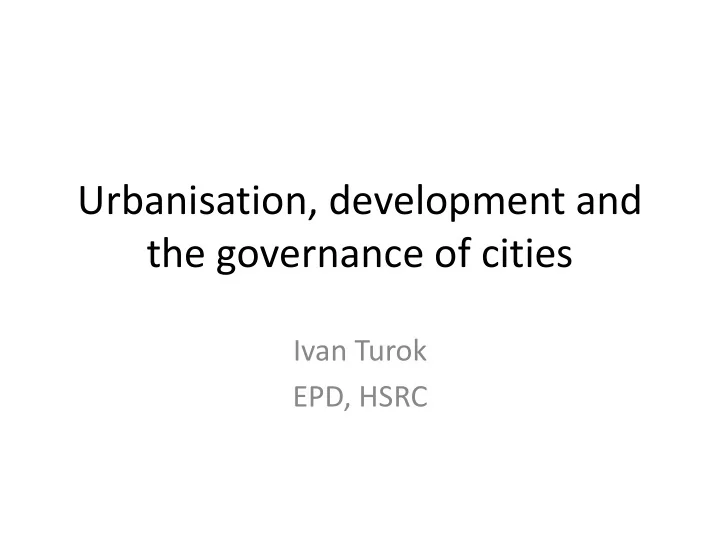

Urbanisation, development and the governance of cities Ivan Turok EPD, HSRC
Inadequate appreciation of … • Economic, social, environmental and political significance of urbanisation (especially in Africa) • Role of local versus national governments in mediating these effects
Contemporary developments in SA • Escalating protest activity in cities • Slower burning issues • Recent political swings in metros • Meaning and significance? – Distinctive urban aspects? – Or merely a reflection of national?
Urbanisation = structural transformation Proximity, density and diversity of people • Nature of social relationships and dynamics – Social mixing & creativity vs differentiation, division, exclusion & conflict • Economic structures, productivity & prosperity – Efficiency & innovation vs congestion & overcrowding • Use of land and natural resources – Resource efficiency vs degradation, insecurity, disasters • Character of politics and governance – Citizenship & democratic innovation vs unmanageable complexity & incompatible systems (formal/informal)
Systemic interactions • Positive possibilities – Density, efficiency, growth, jobs, incomes, taxes, public services, well-being, active citizenship, strong institutions, good governance, public and private investment etc • Negative externalities – Overcrowding, congestion, inefficiency, pollution, stagnation, poverty, discontent, social unrest, instability, weak institutions, informality
Distinctiveness of SA • Ambivalence towards urbanisation reflects: • Historic under-development of rural areas and imperative of redress • Nostalgia for simplicity of rural communities and social values • Electoral arithmetic, stronghold of key faction • Negative effects of urbanisation very visible – Land invasions, squalid/unsafe informal settlements – Pressure on housing and basic services – Impact on environment, water & food insecurity
And yet • ‘Spheres’ of government, not tiers • ‘Developmental’ local government • Creation of large metros for city-regions • Executive mayoral system • Dedicated funding streams – housing, informal settlements, infrastructure, transport, technical support • But sectoral silos, not integrated/joined-up
Complications of governing big cities 1. Socio-economic differentiation and division – hence divergent preferences and priorities 2. Pressures for spatial separation and sorting of social groups 3. Weak leadership and strategic capacity to pursue long-term interests of the city
Governance Examples from SA problem • Disjunction between political and economic Socio-economic differentiation power – small tax base, large needs • Municipal viability vs affordability of services and division – • Tensions between new & existing residents hence divergent • And between formal & informal enterprises preferences and • Often results in heavy-handed regulation & priorities sparks conflict
Governance Examples from SA problem • Gated residential estates & business Pressures for spatial separation precincts • Inner city decay vs suburban affluence vs and sorting of social groups townships • Informal vs formal neighbourhoods • Urban versus rural hinterland • Affordable housing vs gentrification & displacement • Market vs social logic for use of land
Governance Examples from SA problem • Short-term delivery imperative Weak leadership • Desperation for any investment and strategic • Neglect of urban planning & growth capacity to pursue long-term management through land • Poor alignment between sectoral functions interests of the • Loss of specialised skills and expertise city • Tolerance of poor performance and transgressions
Outcomes • Growing protest activity & land invasions • Ratepayer dissatisfaction with declining services, threatened revolts • Local improvement districts & gated precincts risk integrity of public realm & viability of public services • Ongoing social violence and high crime • Social & political instability discourages investment • Short- termism & retreat to “service delivery” • Fragile financial position • Poor audit outcomes
National government response • Increasing rules and regulations • Tighter procedures and “directives” • Less flexibility/discretion in sectoral programmes • Piecemeal support for capacity building • More stringent finances • Compliance culture fosters risk aversion and drives out creativity & innovation • Promotes inward-looking municipal agenda • Are the checks and balances appropriate?
Political contestation • Competition as a powerful incentive to govern well and a discipline to entrenched interests to self-correct • Potential positive effects of recent elections – Higher profile for city-level issues – More serious debate about urban policies – Development, change and transformation as well as better service delivery
Political contestation • But nature of competition – – Short-term, narrow, national agendas – Opportunistic deal-making – Or more inclusive, strategic, city-level agendas? • Governing cities requires shared vision & common purpose – Balancing conflicting interests and imperatives – Engagement with diverse stakeholders • How will ruling party and national departments respond to metros governed by the opposition?
Longer-term possibilities • Ungovernability of cities in 1980s was a key shaper of national democracy • And creation of potentially powerful metros • Is current political ferment a harbinger of positive things to come? • Requires taking the challenge of governing cities more seriously
Recommend
More recommend